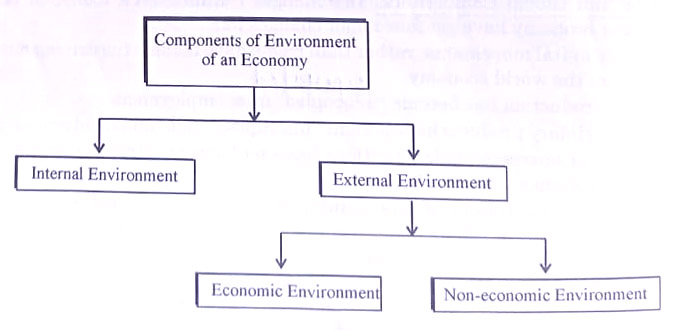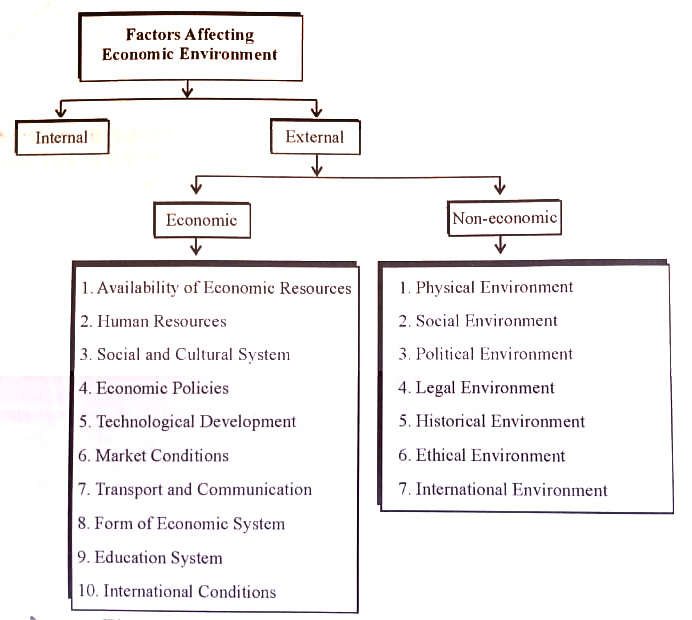BCom Economic Environment Notes Study Material
BCom Economic Environment Notes Study Material: We provide it to all the students of BCom. BCom 1st, 2nd, and 3rd Year Business Environment Notes Study material, question answers, sample papers, mock test papers, and pdf. At gurujistudy.com you can easily get all these study materials and notes for free. Here in this post, we are happy to provide you with BCom 1st Year Economic Environment Notes Study Material.

BCom Economic Environment Notes Study Material
INTRODUCTION
In modern times the economic environment of business is a complex affair. The business is an economic unit and involves the transformation of inputs into outputs-either goods or services. The objective or task of any business is to optimize the outcome of economic activities through logical business decision-making. The business firm may undertake various activities like manufacturing, farming, trading, transporting, mining, banking, etc. to earn profit and maximize it in long run. (BCom Economic Environment Notes Study Material)
A business enterprise works in the expected environment or surroundings. The environment consists of all forces with the potential to influence the organization and its performance. The environment imposes several constraints on enterprises and has considerable impact and influence on the scope and direction of its activities. Every business enterprise has to tackle its internal and external environment. The enterprise has very little control over its environment. (BCom Economic Environment Notes Study Material)
For example, an efficient labor force facilitates the internal environment of any business while the demographic and ecological environment represents the external environment. The internal environment reveals an organization’s strengths and weaknesses, and the external environment reflects the opportunities available to the organization and the threats it faces.
The world Economy has undergone revolutionary changes during the last few decades, the most significant change being that of the emergence of Global Markets and Global Competitors. The changes continue even today. In the last decade, our economy has got four major changes:
(i) Capital movements, rather than trade, have become the driving force of the world economy.
(ii) Production has become “uncoupled” from employment.
(iii) Primary products have become “uncoupled” from the industrial economy.
(iv) The microeconomic situations no longer control the economic outcomes.
The economic system of any country is an empirical hypothesis of its economic environment. There are basically three types of economic systems i.e., Capitalist, Socialist, and Mixed economy.
India is a good example of a mixed economy. In India, while the government owns some of the most important industries, some are owned by private individuals. In a mixed economy, there are three sectors like Public Sector (All firms and business houses are owned by the Government); the Private Sector (All firms and business houses are owned by private individuals); Joint Sector (Which has both public and private enterprises).
India is a large country. Our maximum population lives in villages and in conditions of misery. The main reason behind it is the lack of capital and technical know-how and administrative inefficiency. Yet, a large amount of human and natural resources are present in our country but they are underutilized. Before independence, British Government did not consider the development of the Indian economy. After independence, our Government started ‘five-year plans’ for the economic development of the country. As a result of these plans, we have partially succeeded in solving the problems of poverty, unemployment, inflation, regional imbalances, etc.
MEANING AND CONCEPT OF ECONOMIC ENVIRONMENT
The term economic environment defines as the totality of economic factors such as employment, income, inflation, interest rates, productivity, and wealth, that influence the Business decisions and the buying behavior of consumers and institutions. It is a complex and wide term, affected by several factors such as Income, Investment, Saving, etc. (BCom Economic Environment Notes Study Material)
It combines two words, ‘Economic and ‘Environment’. Environment refers to all external forces which have a bearing on the functioning of an economy According to William F. Glueck and Lawrence Rs. Jauch, “The environment includes factors outside the firm which can lead to an opportunity for or threats to the firm. Although there are many factors, the most important of these factors are Socio-economic, Technological, Supplier, Competitors, and Government.”
The environment can be divided into two categories: (A) Internal Environment, and (B) External Environment.
The external environment is the actual environment of an economy where the organization regulates its work. The internal environment consists of various factors like demographic, economic, natural, technological, political, and cultural factors.
The external environment of an economy can be divided into two parts:
(A) Economic environment, and
(B) Non-economic environment

(A) ECONOMIC ENVIRONMENT
The economic system, economic policies, and other economic conditions are important external factors that constitute the economic environment of an economy. The economic conditions of a country, the nature of the economy (Capitalist, Socialist or Mixed economy), development of the economy (under-develop, developing, or developed), economic resources, the level of income, the distribution of income and wealth are the very important determinants of government strategies. (BCom Economic Environment Notes Study Material)
According to Sterdiwent, “Economic environment refers to those external factors which directly influence the economy of a business.”
Finally, we can say that the economic environment is made up of macro-level factors related to the areas of production and distribution of wealth which assists in the regulation of the economic activities of an organization.
CHARACTERISTICS OF ECONOMIC ENVIRONMENT
The important characteristics of the economic environment are as below:
(1) Related to Economic Activities: Economic Environment is directly related to the economic activities of an economy. It includes all economic activities like Government income and expenditure, Industry, Business Commerce, Agriculture, Transport, Insurance, Banking, etc. The economic environment existing in the country affects economic activities to a great extent.
(2) Effected by Non-economic Environment: The non-economic environment like the Geographical, Social and Political environment affects the economic environment. It is also affected by national and international conditions. The geographical environment includes natural resources, weather, and climatic conditions, location aspects, etc. The social environment excludes social culture, education, health, etc. and the political environment includes the administrative system, types of economy, economic policies, and other factors. All of these influence the economic environment. (BCom Economic Environment Notes Study Material)
(3) Operated and Guided by Government: Economic environment works under the control and guidance of the government. In a capitalist economy, the government adopts the policy of minimum interference but in a Socialist economy, Government itself operates all economic activities. Thus, the economic environment is affected by Government policies, guidance, assistance, and control.
(4) Availability of Capital: Availability of sufficient capital tends to effective utilization of available natural and human resources which facilitates to increase in income, investment, employment, and economic development of a country.
(5) Infrastructure: Economic environment is influenced by the availability of infrastructure facilities like electricity, power generation, water resources, transport and communication, banking, and insurance. The presence of these facilities adds to economic development.
(6) Made up of Macro Level Factors: The economic environment is made up of macro-level factors related to the areas of production and distribution of wealth. These factors are economic stages (under-developed, developing, or developed); economic structure like Capitalistic, Socialistic or Mixed economy; economic planning and policies; economic indices like national income, per capita income, growth rate, GNP, distribution of income, rate of saving, the balance of payments, etc. (BCom Economic Environment Notes Study Material)
OBJECTIVES OF THE STUDY OF THE ECONOMIC ENVIRONMENT
The main objectives of the study of the economic environment are:
(i) To understand about the economic environment for the successful operation and development of an economy. Thus, its objectives are economic development and the successful operation of the economy.
(ii) To know about the changes taking place in the economy.
(iii) To introduce the latest technologies, resources, and use of opportunities.
(iv) To study environmental elements so as to cope with dynamic conditions.
(v) To maintain the environment according to the development requirements of an economy.
(vi) To ensure maximum utilization of resources for the development of the country.
(vii) To understand the global environment to cope with our economic environment to attract foreign capital and entrepreneurs.
FACTORS AFFECTING THE ECONOMIC ENVIRONMENT
or
COMPONENTS OF ECONOMIC ENVIRONMENT
The economic Environment refers to the economic system in a country. It is affected by national and international forces. The main factors affecting the economic environment are:
(i) Availability of Economic Resources: Availability of physical and natural resources like material, equipment, finance, labor supply, infrastructural facility, etc. affect the economic environment of the country. The scarcity of these resources may delay organizing economic development at the lowest cost. Non-availability of these inputs makes it difficult for the organization or a country to attain its objectives.
(ii) Human Resources: National demographic factors such as the size of the population, age composition, population growth rate, life expectancy, etc. directly affect the economic environment. Markets with growing populations and income are growth markets. But the decline in the birth rates in countries has adversely affected the demand. A rapidly increasing population indicates a growing demand for many products. A high population growth rate will increase the labor supply and will affect the wage rate.
(iii) Social and Cultural System: The social-cultural fabric is an important environmental factor that affects the economic environment. The buying and consumption habits of the people, their language, beliefs and values, customs and traditions, tastes and preferences, and education are all socio-cultural factors that affect the economic environment. (BCom Economic Environment Notes Study Material)
Social-cultural factor determines the dominant view of people about business, Union-Management relations, mobility of people, and what business should be done to promote cultural activities and traditions. Society gives the business a charter for existence and business has reason to exist as long as society desires.
(iv) Economic Policies: Economic policies decide the direction of the business. Economic policies prepare the economic environment. Moreover, economic policies also clarify the stand of the Government towards business. Government policies such as the industrial policy, fiscal policy, policies of economic reform like liberalization, privatization, globalization, tariff policy, etc. may have a profound impact on business. For example, the policy of liberalization in India has opened up new opportunities and threats. They have provided a lot of opportunities to diversify and to make their product mix better. But on other hand, a serious threat may arise by way of increased competition.
(v) Technological Development: Technological development is an important factor that affects the economic environment of a country or business. Technology is a systematic application of scientific knowledge to a practical task. Technological upgradation keeps pace to ensure necessary changes in the transformation process and in goods and services. A businessman should be ever alert to adopt changing technology to their business. A firm that is unable to cope with the technological changes do not survive. Technological developments may increase the demand for some existing products and services. (BCom Economic Environment Notes Study Material)
(vi) Market Conditions: Market conditions play an important role in the determination of the business environment. Perfect competition, monopoly, and imperfect competition also influence the business environment. Under perfect competition, optimum utilization of resources is possible. Under imperfect competition, cut-throat competition prevails in the market and low production, higher cost, and high price prevail in the monopoly market. Thus, these above conditions are determinants of the economic environment.
(vii) Transport and Communication: Transport and Communication System is also an important element of the economic environment. Means of transportation include Roadways, Railways, Shipways and the means of communication are postage, telephone, and other electronic equipment, etc. Well-organized and developed means of transport and Communication mobilize the whole economic system and ensure economic development. (BCom Economic Environment Notes Study Material)
(viii) Form of Economic System: Economic systems like communists, capitalists, and socialists affect the economic environment of a country. For example, under a socialist government, the state owns all the means of production and controls the economy according to a Central master plan. In a mixed economy like India, the public and private sectors co-exist and there is a number of economic and labor laws that regulate the conduct of business. These Laws are MRTP Act, Court laws, Industrial laws, Commercial laws, Acts for taxation, Factory act, etc.
(ix) Education System: Education System plays an important role in the economic development of a nation. Technical education in place of general education and training facilities pace economic development. Indian education system requires a change to coordinate with the global business environment. If the education system stresses self-reliance and coordinates with the business environment, it will be helpful in economic development.
(x) International Conditions: International conditions and mutual relations on global labels affect the economic environment of a country. International conditions like foreign aid, economic policy, the balance of payment, exchange rate, etc. affect economic development. International agreements, foreign trade policies, and better International relation help to improve economic conditions and employment generation for any country. (BCom Economic Environment Notes Study Material)
(B) NON-ECONOMIC ENVIRONMENT AND ITS COMPONENTS
Non-economic environment combines all non-economic factors under which the business organization of the country works. These factors are clearly explained below:
(i) Physical Environment: National resources and other physical conditions like climate, energy, water, petroleum, mountains, plains, oceans, rivers infrastructural development, public utility services, etc. constitute the physical environment of a business. The physical environment of a business influence the structure and further development of the business. These factors influence production demand, distribution of goods, material mix, marketing mix, cost-price structure, etc.
(ii) Social Environment: The components of a non-economic social environment are:
(a) Age structure, sex ratio, religion, caste, education, etc.
(b) Family structure may be nuclear or joint.
(c) Responsibility of public-faith in the co-operative organization, private organization or welfare organization, or religious-socio organization.
(d) Attitude towards management.
(e) Customs
(f) Approach – Traditional or Scientific
(g) Mentality of public towards work.
(iii) The Political Environment: It includes the following components:
(a) Political stability
(b) Public welfare policies
(c) Foreign policy
(d) Bureaucracy
(e) Government laws and policies.
(iv) Legal Environment: Legal environment is a prime component of the non-economic environment of a business. It is a regulatory framework of business. These components are:
(a) Economic policies
(b) Constitutional provisions
(c) Economic laws-MRTP, FEMA, etc.
(d) Tax laws and policies
(e) Industry and labor laws etc.
(v) Historical Environment: The historical heritage of the country also influences the current environment of business. History is not to be treated as a dead past because we learn from our past happenings and ideologies. For example, religious unrest in past has had a great impact on the future business environment. (BCom Economic Environment Notes Study Material)
(vi) Ethical Environment: Ethical values of Society are also important factors that affect the economic environment. These ethics refer to the code of conduct and guidelines that guide an organization in dealing with others. Expectations of our society to business to act ethically. For example, the adoption of social responsibility may be an ethical value of a business. Business ethics are the key to the success of business in the long term.
(vii) International Environment: International Environment of a country includes export-import, money inflation, recession, and other foreign policies. A recession in foreign markets may create difficulties for industries depending on exports. On the other case, a boom in the export market may help the export-related industries. For example, oil price hikes affect various global economies.
We can show these factors with the help of the following chart:

SIGNIFICANCE OF THE STUDY OF THE ECONOMIC ENVIRONMENT
The study of the economic environment of business is necessary to cope-up with new constraints and opportunities in the business world. There are various advantages or reasons to study about Economic Environment of a business. These reasons are as below:
(i) To Corporate Planning and Policy Decisions: The study of the economic environment is helpful in formulating corporate planning and making policies and strategies for the future. A business enterprise has to formulate its policies in accordance with the Economic Environment of the Business. For example, the last restriction on export-import by the Government opens new opportunities for exports in India. Before policymaking business managers analyze the strengths, weaknesses, opportunities, and threats for their organization to make better decisions. (BCom Economic Environment Notes Study Material)
(ii) To know about Technological Advancement: Knowledge of new technologies, new products, and new designs is necessary to face competitors and other challenges in the business world. It is essential for every business manager to have complete knowledge about technological upgradation in business activities. (BCom Economic Environment Notes Study Material)
(iii) To Understand International Environment: Every business is affected by Internation economic environment. It is necessary to know about the global economic environment like trade cycles, recession, international agreements and declarations, global financial crisis, etc. This knowledge will help the business to grow successfully in the global scenario.
(iv) To Analyse External and Internal Economic Factors: It is essential to analyze external and internal economic factors to take quick decisions about the business. These factors are (i) Internal Strategy, Financial resources, Marketing capabilities, Competitors, etc. (ii) External-Political and legal, Eco-socio environment, Demographic, Ecological and Natural, etc.
(v) To Ensure Optimum Utilisation of given Resources: Through knowledge of the economic environment business managers can ensure effective utilization of resources in an economical manner. For example, when we have knowledge of a hike in market conditions well in advance, we can accelerate the rate of production. (BCom Economic Environment Notes Study Material)
BCom 1st Year Economic Environment Notes Study Material
Bcom 1st Year Sample Model Practice Mock Test Question Answer Papers